Speaking at a Tech Event for the First Time: My Experience
 Shivam Katare
Shivam Katare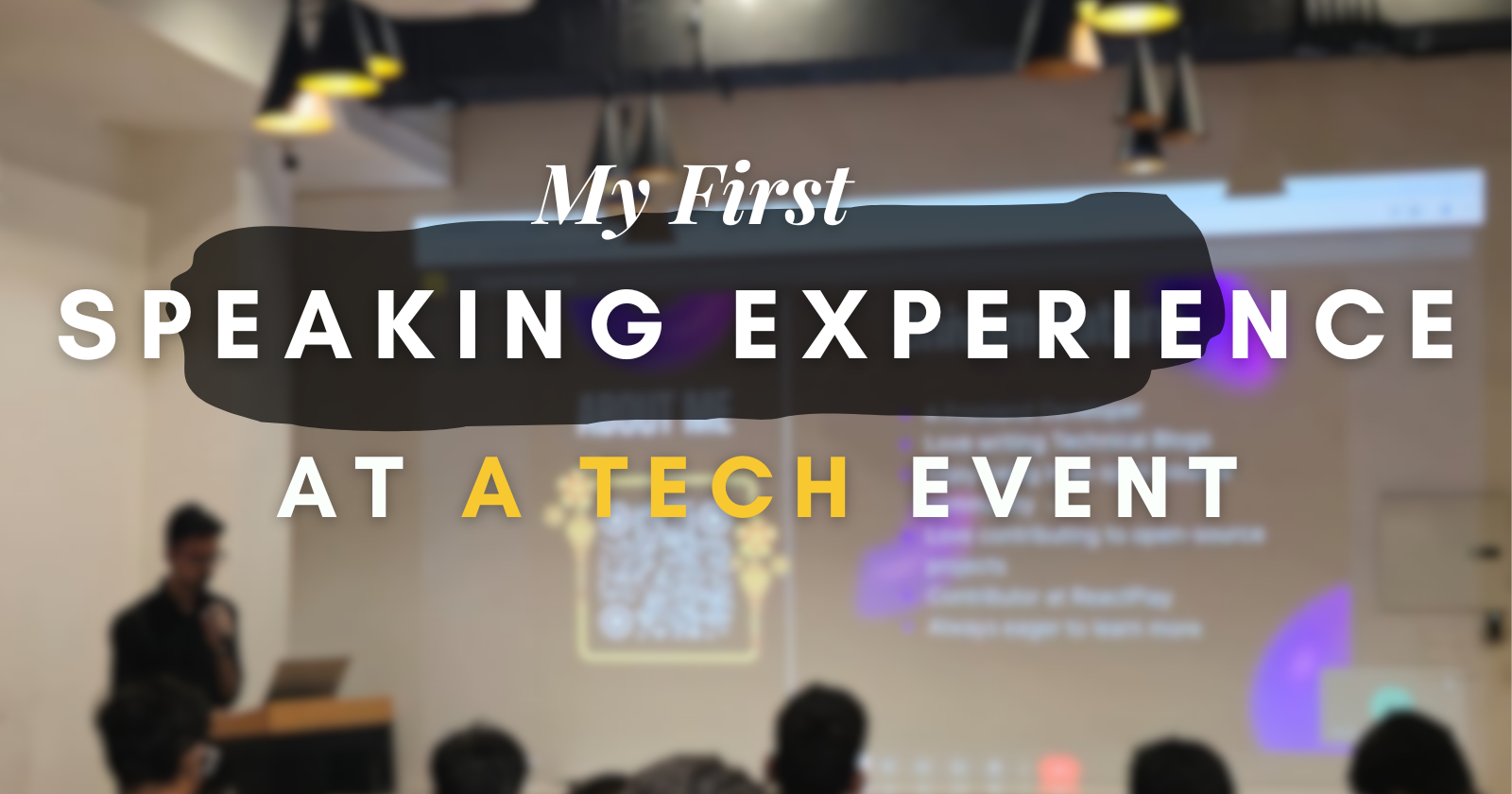
The first time for anything always feels special. It could be the first interview, job offer, salary, or anything else. The first time feels special because it gives us new learnings, new perspectives, and new ways to think about our next steps. In this blog, I am going to share my first-time experience as a speaker at a tech event and my first in-person meetup. The best part is, that I attended my first tech event as a speaker.
So, without further delay, let's get started.
Introduction
I am Shivam, a recently graduated computer science student, currently working as a frontend developer at an American-based startup. I love contributing to open-source projects, writing technical blogs, and being part of a community. With this passion, I always wanted to share my learnings at a tech event. Finally, I got the chance to speak at a tech event on June 29, 2024 (yeah😅, I know I am publishing this a bit late, but better late than never). This date will always be memorable. I learned a lot and shared a lot. Let's explore all of that in the next sections.
The Conference
The conference that allowed me to speak at an in-person event was JSLovers. For those who don't know, JSLovers is a well-known tech meetup community for JavaScript developers. It's a place where JavaScript enthusiasts gather to share knowledge, learn about the latest trends and network with like-minded individuals.
I had the chance to speak at their Delhi meetup on the topic of React 19. My presentation was titled "React 19 and the Chamber of Secrets," and I covered topics of React 19 features, including server components, asset loading, actions, and enhanced hooks.
Deciding to apply
In my third year of college (2023), I got to know about tech conferences. The first one I discovered was React India. At that time, I was looking for a job and landed on the React India website because they were hiring volunteers. I applied but unfortunately didn't get selected. After applying, I started exploring their website and realized that these events not only feature experienced speakers but also welcome knowledgeable first-time speakers.
I applied with a very poor CFP (Call for Proposals) because I didn't know how to write a good one, so it was rejected. However, from that experience, I set a goal. I realized that these events are a great opportunity to meet industry professionals, gain knowledge, and build confidence by speaking at events. From that point on, I applied to many conferences. Finally, JSLovers CFP was selected, and I got a chance to speak at a JSLovers Meetup. On May 30th, I saw their post mentioning that they had opened a CFP form, and a month earlier, my CFP had been rejected by ReactNexus.
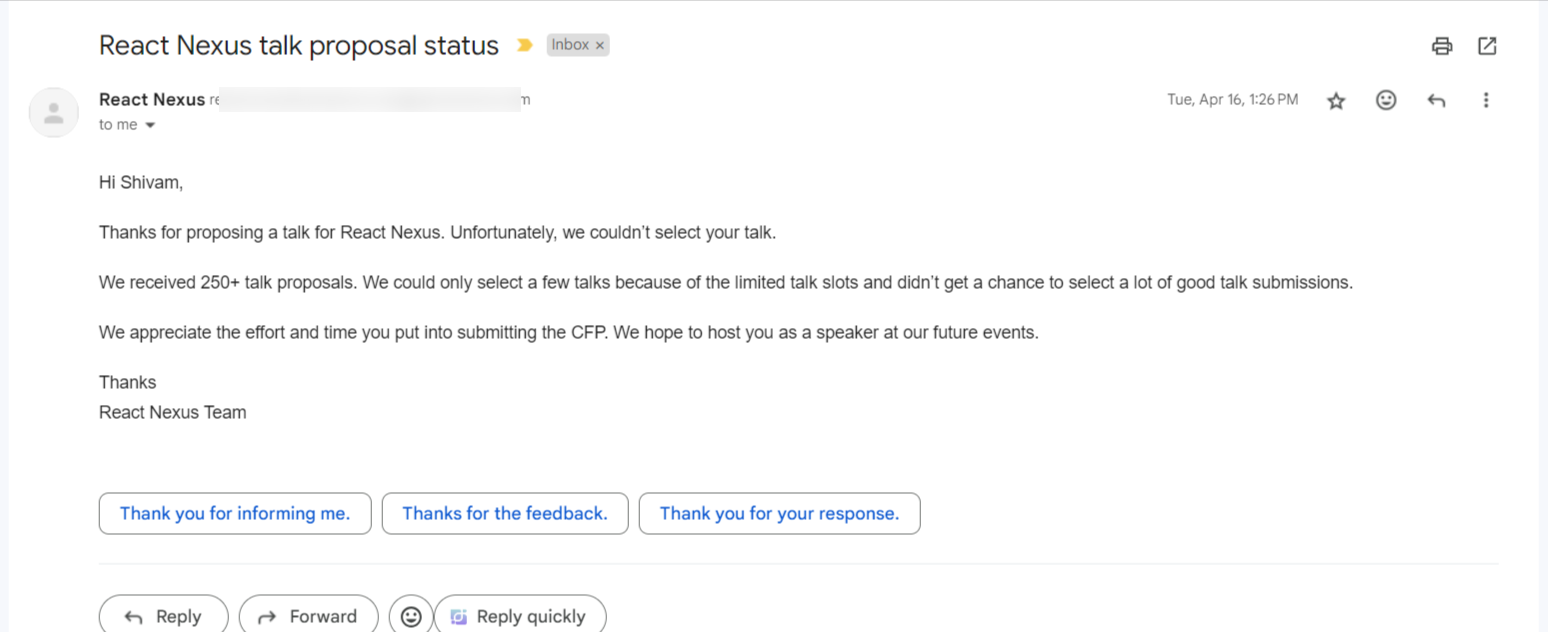
So, I was fully motivated, thinking, "Now I know how to avoid those mistakes and write a better CFP." I followed the tweet and filled out the form.
And yay🥳!!! It got selected. But how did this one get selected and not the others? What did I write in this CFP? and how was the experience? Let's explore all of this in the next section.
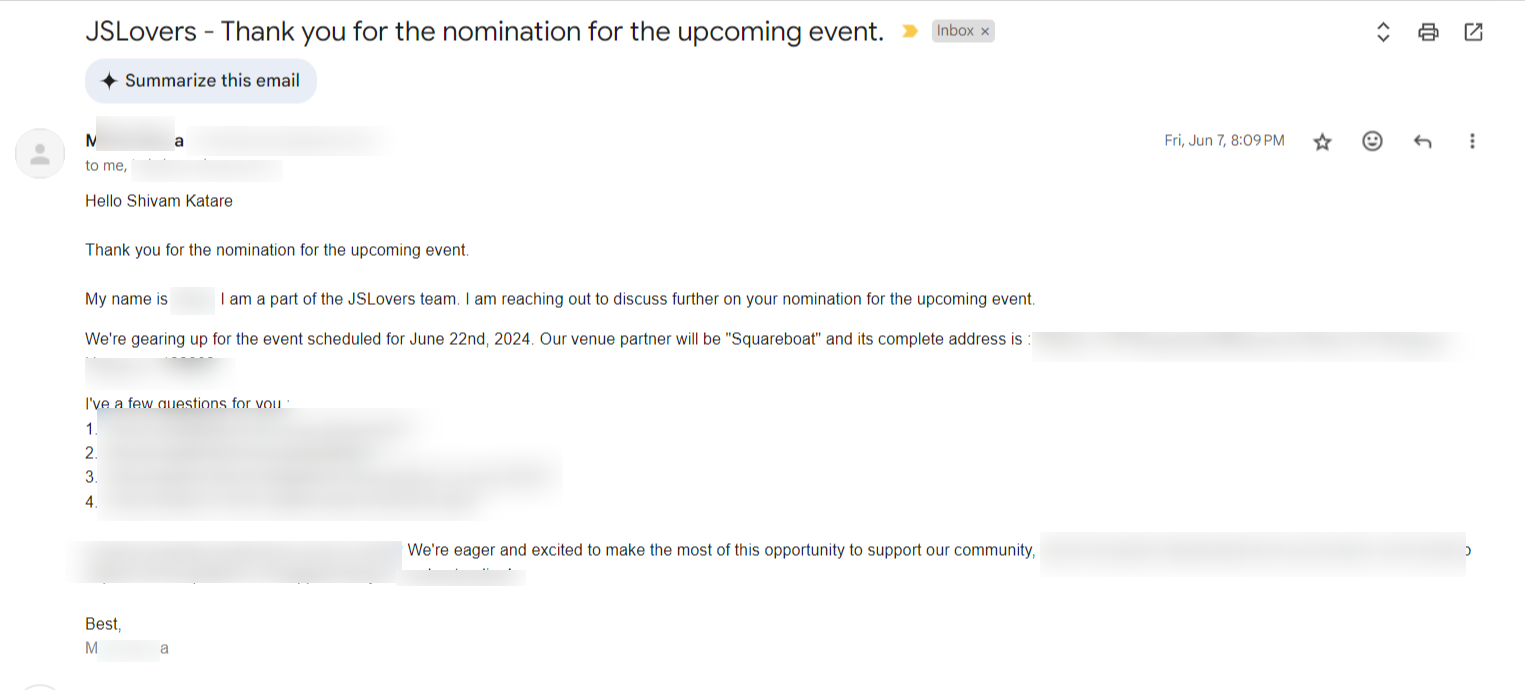
Experience
I had an online demo session with the JSLovers team when I received the email. During this session, I received feedback and suggestions to improve my presentation. After adding their input, I was very excited about the talk. The event was initially scheduled for June 22nd but was later moved to June 29th.
On June 28th, I was nervous. I was worried about what would happen at the event, how I would start conversations with people I didn't know, where I would find a place to sit, and what I should say when I got there. I had never been to an in-person event before, and because I'm a bit shy and introverted, these thoughts made me feel anxious. I would appreciate any tips on handling these kinds of situations, so please share your advice in the comments below.
I woke up around 4 AM, got ready, and took the metro at 6:30 AM. Despite my nervousness, I was ready to hit the stage.
I reached the destination. There were only a few people there (I arrived too early 😅), so I thought about recording some videos, but my shyness stopped me.
I sat down without talking to anyone, just thinking about how I would talk to everyone. After 15 minutes, people started arriving, including the organizers. Meeting them made me feel a bit better. The event began about 20 minutes later. I was set to speak second, and I felt pretty good about what I was going to talk about. I was excited for my turn to speak.
The first talk finished, and my name was announced. As I walked up to the stage, I felt a bit nervous again, but once I grabbed the mic, all my nervousness disappeared.
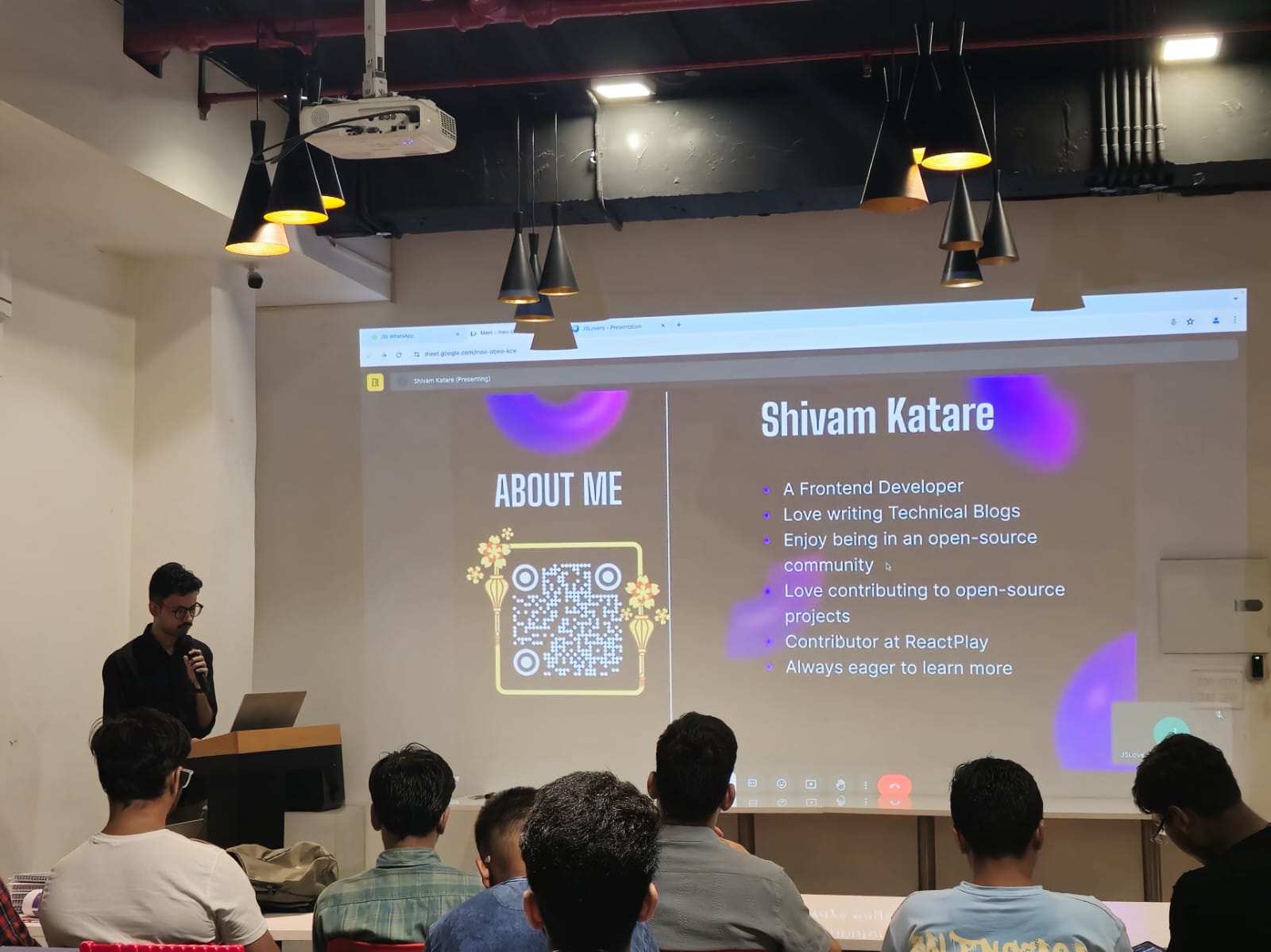
It was just me, my talk, and the audience with their questions and appreciation. My talk lasted about 40-45 minutes and went great. When I finished, everyone applauded and appreciated my talk. It felt like a hero moment, standing in front of everyone and receiving their appreciation for the effort that we made.
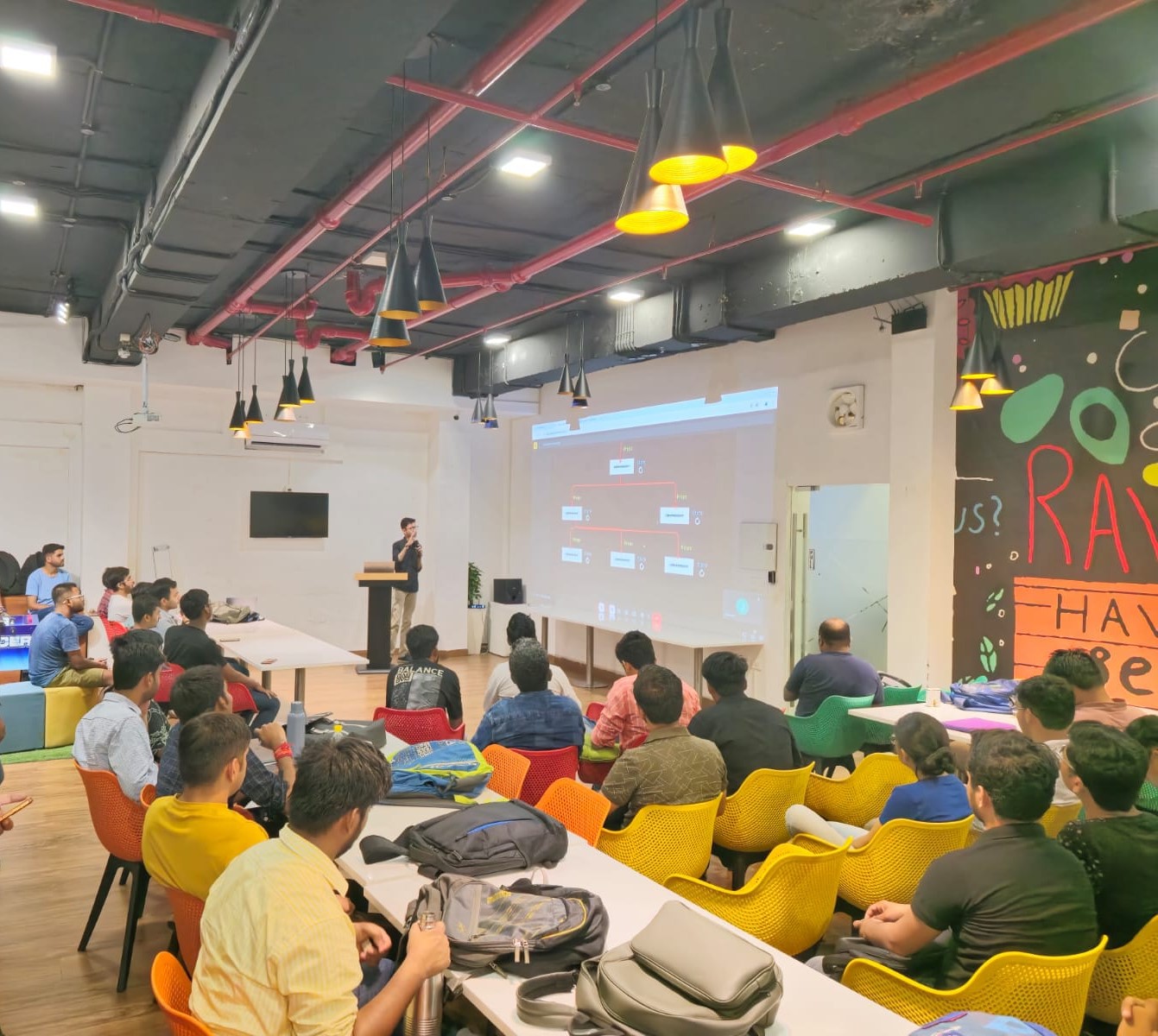
After that, a 30-minute break for networking began, and I connected with many people. We talked about jobs, tech, and personal views on various topics. It felt like we had known each other for a long time. It was a great experience.
Following the break, there were two more talks about Polyfills and TypeScript. After those talks, the event ended. We took a group photo, clicked pictures with everyone, and then headed back home.
Learnings
My first time speaking at a tech event was a really valuable experience. I learned a lot and gained some important lessons.
Preparation is key: The online demo session with the JSLovers team was crucial. Their feedback helped me refine my presentation and boosted my confidence. Always be open to constructive criticism and use it to improve your content.
Embrace nervousness: It's normal to feel anxious before your first speaking engagement. Instead of trying to get rid of these feelings, use them as positive energy. Remember, a bit of nervousness can keep you alert and focused.
Confidence grows on stage: Even though I was nervous at first, I felt more confident once I started speaking. Trust in your preparation and your understanding of the topic.
Networking is priceless: The connections made during the networking break were a highlight of the event. These interactions can lead to future opportunities, collaborations, or simply enriching professional relationships.
Community support: The tech community, especially at events like these, is supportive and encouraging to newcomers. Don't hesitate to put yourself out there.
Follow-up matters: After the event, I realized the importance of following up with the connections I made. Whether through LinkedIn or email, maintaining these relationships can be beneficial for future collaborations or opportunities.
Speaking at this tech event was about more than just giving a talk; it was about personal growth, engaging with the community, and professional development. These experiences have boosted my confidence for future speaking engagements and improved my approach to professional interactions in the tech world.
For future events, I am very excited and am now learning more to prepare myself for big tech events. I have submitted my CFP for React India 2024 and am 🤞hoping for the best.
Writing an Effective CFP: How I Got Selected
I am not experienced in writing CFPs, but below are a few things that I learned by writing many CFPs and learning from their rejections:
Focus on the "How" and "Why," not just the "What": When selecting topics for your CFP, don't just choose to tell your audience "WHAT." Try to include "HOW" and "WHY" too. For example, if you choose React as your topic, don't just focus on "What is React?" Instead, mention and focus on:
Why React?
Why do we need it?
Is it really better or necessary? If yes, how?
What problems does it solve?
Organizers want to choose talks that make sense and provide value to their audience. Put yourself in the attendees' shoes - they expect great talks that offer valuable insights.
Be specific and unique: Highlight what makes your talk different from others on similar topics. Share personal experiences or unique perspectives that can add value to the audience.
Clear and concise title: Create a title that accurately represents your talk and catches attention. Avoid clickbait but make it intriguing.
Let's say you're giving a talk about optimizing React applications for better performance. Here are a few examples of how you could craft the title:- Bad (too vague): "Making React Better"
- Bad (clickbait): "The ONE WEIRD TRICK to Make Your React App Lightning Fast!"
- Good: "React Performance Optimization: Strategies for Faster Apps"A good example is easy to understand, gets to the point without using too many words, and makes you interested in what it has to offer. It should be informative but not try to trick you into clicking on it, and it should be something that would appeal to people who work with React.
Well-structured description: Provide a clear outline of what you'll cover. Use bullet points to break down the main topics you'll discuss.
Highlight takeaways: Clearly state what the audience will learn or gain from your talk. This helps organizers understand the value you're bringing.
Proofread and edit: Ensure your proposal is free of grammatical errors and typos. A well-written CFP demonstrates professionalism and attention to detail.
Submit early: Don't wait until the last minute. Early submissions often get more attention and consideration.
Learn from rejections: If your CFP doesn't get selected, don't be discouraged. Ask for feedback when possible and use it to improve future submissions.
For this particular CFP that got selected, I made sure to apply these principles. I focused not just on explaining React 19, but on why it's important, how it differs from previous versions, and what problems it solves for developers. I structured my proposal to show that I would provide practical insights and not just theoretical knowledge.
Remember, when writing a CFP, approach it from an attendee's point of view. Submit a talk proposal that you would be excited to attend yourself. The goal isn't just to get selected; it's to share valuable learning with others and contribute meaningfully to the tech community.
By following these things and continuously improving my CFP writing skills, I was able to create a proposal that resonated with the event organizers and ultimately led to my selection as a speaker.
Conclusion
That's it for this blog, I hope you enjoy reading it. I write blogs and share content on JavaScript, TypeScript, Open Source, and other web development-related topics. Feel free to follow me on my socials. I'll see you in the next one. Thank You :)
Subscribe to my newsletter
Read articles from Shivam Katare directly inside your inbox. Subscribe to the newsletter, and don't miss out.
Written by

Shivam Katare
Shivam Katare
👋 Hey there! I'm Shivam, a self-taught web developer from India. My passion lies in web development, and I thrive on contributing to open-source projects and writing technical blogs. 🚀 Teamwork fuels my creativity, and I take pride in building efficient, user-friendly solutions. Let's code together! 💻🌟